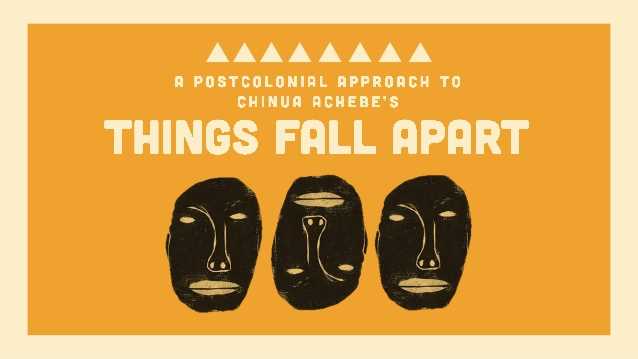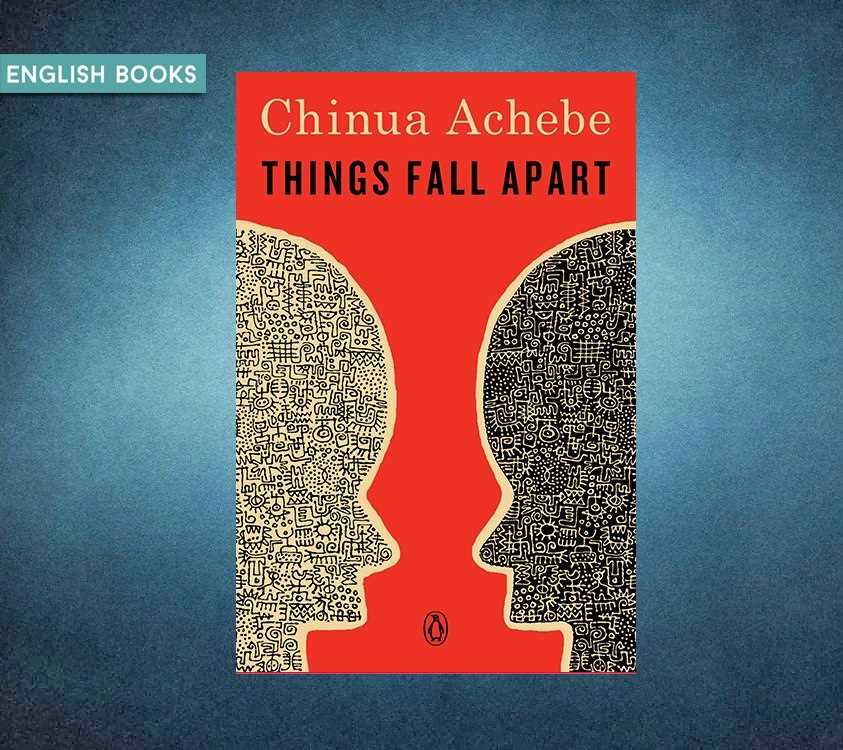
Things Fall Apart is a renowned novel written by Chinua Achebe that tells the story of Okonkwo, a respected warrior in a Nigerian village. The book explores themes of culture clash, colonialism, and the consequences of societal change. Assessing students’ understanding of this powerful novel is essential to gauge their comprehension and insights. A well-designed “Things Fall Apart” test can evaluate students’ ability to analyze characters, identify cultural nuances, and examine the overarching themes.
The “Things Fall Apart” test should challenge students to think critically about the events, characters, and cultural clashes that shape the narrative. It should consist of a variety of question types, such as multiple-choice, short answer, and essay questions, to assess different aspects of students’ understanding. The test should also encourage students to provide textual evidence to support their answers, promoting close reading and analysis of the novel.
One key aspect to include in the test is the examination of character development. Students should be asked to analyze how Okonkwo’s character evolves throughout the novel and the factors that contribute to his downfall. They should also consider the roles of other significant characters, such as Nwoye, Obierika, and Ikemefuna, and how their actions and decisions impact the story.
Cultural understanding is another essential element to assess in a “Things Fall Apart” test. Students should demonstrate their knowledge of Igbo customs, traditions, and beliefs, as well as the clash between Igbo culture and the arrival of European missionaries. Examining how Achebe portrays these conflicting cultures and the subsequent consequences will highlight students’ comprehension of the novel’s central theme.
Understanding the Themes and Context of “Things Fall Apart”
Chinua Achebe’s novel “Things Fall Apart” delves into a rich tapestry of themes and explores the complex historical and cultural context of pre-colonial Nigeria. The novel presents a vivid portrayal of the Igbo society before the arrival of European colonizers, highlighting the clash between traditional African values and the encroaching influence of the Western world.
One of the central themes of the novel is the concept of identity and cultural heritage. Achebe explores the idea of how individual identities are shaped by the customs, traditions, and beliefs of their community. The protagonist, Okonkwo, struggles to maintain his identity and uphold the values of his ancestors in the face of colonialism. As the world around him rapidly changes, he grapples with the fear of losing his cultural heritage and the erosion of traditional values.
Achebe also touches upon the theme of masculinity and the expectations placed on men within the Igbo society. Okonkwo, the epitome of masculinity, adheres to the rigid gender roles and expectations imposed by his community. His obsession with masculinity becomes a driving force behind his actions and decisions. However, as the novel progresses, Okonkwo’s rigid adherence to these ideals ultimately leads to his downfall.
Moreover, colonialism and its impact serve as a significant theme in “Things Fall Apart”. Achebe explores the devastating consequences of the arrival of European colonizers in Africa, as they impose their values, institutions, and religion on the native population. This collision of cultures leads to conflict, loss of autonomy, and the destruction of traditional African society. Achebe critiques the arrogance and ignorance of the colonizers, illustrating the detrimental effects of their actions on the indigenous people and their way of life.
The novel “Things Fall Apart” offers readers a profound exploration of themes such as identity, masculinity, and the profound impact of colonialism. Through its vivid storytelling and detailed examination of the Igbo society, Achebe presents a thought-provoking narrative that forces readers to grapple with the complexities of cultural collision and the struggle for individual and collective identities.
The Significance of “Things Fall Apart” in African Literature

Achebe’s novel “Things Fall Apart” holds immense significance in African literature. It is one of the pioneering works that contributed to the emergence and development of African literature as a distinct genre. By telling the story of Okonkwo, a traditional Igbo warrior, Achebe not only provides a vivid portrayal of pre-colonial African society but also challenges the stereotypes and oversimplifications imposed by colonial literature.
The novel explores the complexities of African culture, traditions, and values, showcasing the rich and diverse heritage that existed before the arrival of European colonial powers. Achebe presents a nuanced perspective that humanizes African characters and their experiences, allowing readers to develop a deeper understanding and appreciation for African culture. One of the key messages of “Things Fall Apart” is the resilience and strength of African societies, which were often undermined and dismissed during the colonial era.
The novel also highlights the devastating impact of colonialism on African communities. Through the character of Okonkwo, who struggles to adapt to the changes brought about by colonial rule, Achebe sheds light on the loss of identity, cultural erosion, and violence inflicted upon indigenous communities. “Things Fall Apart” serves as a powerful critique of the destructive nature of colonialism and its lasting effects on African societies.
In addition to its thematic significance, the novel also revolutionized the literary landscape by challenging the dominant narrative of African people as primitive, savage, and inferior. Achebe’s use of English language infused with Igbo idioms and proverbs not only created a unique style but also asserted the legitimacy and richness of African languages and oral traditions. This innovative approach laid the foundation for future African writers to explore and express their cultural identities through their own unique literary voices.
- “Things Fall Apart” is not only a timeless classic but also a seminal work that paved the way for the growth and recognition of African literature worldwide.
- The novel continues to resonate with readers from diverse backgrounds, fostering empathy, understanding, and challenging colonial narratives.
- Its profound exploration of African culture, the impact of colonialism, and the resilience of African communities make it an essential read for anyone interested in understanding the complexities of the African experience.
Exploring the Characters of “Things Fall Apart”
Chinua Achebe’s novel, “Things Fall Apart,” is a compelling story set in Nigeria during the late 19th century. The characters in the book are vividly portrayed and provide a nuanced exploration of various themes such as tradition, colonialism, and the clash of cultures. Each character is unique and plays a vital role in shaping the narrative and reflecting the realities of the time.
Okonkwo is the protagonist of the story and embodies the complexities of masculinity in Igbo society. He is a proud and ambitious man who strives for success and fears failure. Okonkwo’s determination to distance himself from his father’s weaknesses leads him down a destructive path, leading to tragic consequences. Through Okonkwo, Achebe highlights the tensions between tradition and change, as well as the pitfalls of toxic masculinity.
Ezinma, Okonkwo’s daughter, stands out as a strong-willed character who challenges gender norms and expectations. Despite being a girl, she displays intelligence, bravery, and resilience, earning her father’s admiration. Ezinma becomes a symbol of hope and strength in a society that often undervalues women. Her portrayal challenges the notion that women are passive and powerless.
- Mr. Brown, the first white missionary to come to Umuofia, represents a more compassionate and understanding approach to Christianity. He values dialogue and respect for local customs, earning the loyalty and trust of some villagers. However, his successor, Reverend James Smith, takes a more aggressive and intolerant stance, leading to increased tension between the villagers and the missionaries.
- Nwoye, Okonkwo’s eldest son, symbolizes the generational divide and the impact of colonialism on traditional values. Nwoye’s decision to convert to Christianity causes a rift between him and his father, as well as a loss of connection to his culture. His transformation reflects the larger theme of cultural erosion and the struggle to preserve African identity in the face of colonial influence.
Overall, the characters in “Things Fall Apart” are multi-dimensional and provide a rich and nuanced portrayal of Nigerian society during a time of profound change. Through their experiences and interactions, Achebe navigates complex themes and provokes readers to question the impact of colonialism and the preservation of cultural heritage.
Analyzing the Protagonist, Okonkwo

Okonkwo, the protagonist of Chinua Achebe’s novel “Things Fall Apart,” is a complex character with a strong personality and a tragic fate. He is depicted as a man who embodies the traditional values and ideals of the Igbo society in Nigeria, but also struggles with his own flaws and inner demons.
One of Okonkwo’s defining characteristics is his ambition and determination to succeed. He is driven by a deep desire to rise above his father’s legacy of laziness and weakness, and to become a respected and influential figure in his community. Okonkwo’s hard work and perseverance enable him to accumulate wealth, achieve success in his farming endeavors, and gain numerous titles and honors within the society.
However, Okonkwo’s strength and success are also accompanied by a profound fear of failure and weakness. He believes that showing any sign of vulnerability or emotion is a sign of weakness, and he constantly strives to suppress his emotions and maintain a stoic facade. This fear of weakness is deeply rooted in his troubled relationship with his father, who was seen as effeminate and cowardly by the community. Okonkwo’s fear drives him to act impulsively and violently, often leading to tragic consequences.
Despite his strengths as a leader and his successes, Okonkwo’s rigid adherence to traditional values and his inability to adapt to changing circumstances ultimately lead to his downfall. As British colonialism begins to infiltrate the Igbo community, Okonkwo finds himself resisting the change and clinging to the old ways. This stubbornness and refusal to adapt ultimately isolates him from the rest of the society and contributes to his tragic fate.
Overall, Okonkwo is a complex character who embodies both admirable qualities and deep flaws. His ambitious nature, fear of weakness, and resistance to change contribute to his ultimate fall from grace. Through Okonkwo’s journey, Achebe explores themes of the clash between tradition and change, the consequences of pride and stubbornness, and the impact of external forces on individual lives.
Unveiling the Complex Character of Nwoye
Throughout Chinua Achebe’s novel “Things Fall Apart,” Nwoye’s character undergoes a dramatic transformation, showing a complex combination of internal conflict, cultural clashes, and personal growth. Nwoye, the son of Okonkwo, starts off as a timid and sensitive young man, who struggles to meet his father’s expectations and fit into the masculine ideals of their Igbo society.
The tension between Nwoye and Okonkwo is evident from the beginning of the novel, as Nwoye’s interests and personality deviate from the strict and aggressive masculinity valued by his father. Okonkwo, being a traditionalist and a war hero, disapproves of Nwoye’s sensitivity and fondness for storytelling. He often berates and chastises his son, trying to mold him into a more assertive and strong-willed individual. However, these attempts only deepen the divide between them, pushing Nwoye further away from his father and their cultural traditions.
The turning point for Nwoye comes with the arrival of the Christian missionaries to their village. The new religion offers Nwoye a sense of belonging and acceptance that he had never experienced before. The missionaries’ teachings resonate with Nwoye, who finds solace in the Christian concept of a loving and forgiving God, in contrast to the harsh and punishing gods of his ancestors. This newfound faith provides Nwoye with the strength and courage to break free from the constraints of his culture and make a choice that shocks his family and community.
Overall, Nwoye’s character represents the complexities of individuality and the clash of cultures in “Things Fall Apart.” His journey from a timid and conflicted young man to an independent thinker and follower of a new faith highlights the power of personal choice and the importance of understanding the motivations and conflicts within individuals. Through Nwoye’s story, Achebe reminds us that identities are not fixed but shaped by a multitude of factors, and that sometimes, the courage to break away from tradition can lead to personal growth and enlightenment.
Examining the Cultural Traditions and Customs in “Things Fall Apart”
Chinua Achebe’s novel, “Things Fall Apart,” provides a rich exploration of the cultural traditions and customs of the Igbo people in pre-colonial Nigeria. Through the protagonist, Okonkwo, and his interactions with various members of the community, the novel delves into the complexities and significance of these traditions.
One of the central aspects of Igbo culture depicted in the novel is the importance of family and kinship. The Igbo society places a strong emphasis on extended family networks, with kinship ties playing a vital role in the social fabric. This can be seen through Okonkwo’s relationship with his own family members, as well as his interactions with the wider community. The novel highlights how the bonds of kinship provide support, stability, and a sense of belonging for individuals within the community.
Another significant cultural tradition explored in the novel is the practice of religion and spirituality. The Igbo people have a rich spiritual belief system that is deeply intertwined with their daily lives. Traditional gods and oracles are worshipped and consulted for guidance and protection. The novel depicts various rituals and ceremonies associated with religious practices, showcasing the importance of spirituality in maintaining harmony and balance in the community.
Furthermore, “Things Fall Apart” also sheds light on the role of storytelling and oral tradition in Igbo culture. The oral tradition, in the form of myths, proverbs, and folktales, plays a crucial role in passing down cultural values and history from one generation to another. It serves as a means of education and communication, preserving the collective memory of the community. The novel showcases the power of storytelling in shaping identity and providing individuals with a sense of cultural heritage.
In conclusion, “Things Fall Apart” offers readers a nuanced examination of the cultural traditions and customs of the Igbo people. Through its portrayal of family dynamics, religious practices, and the significance of storytelling, the novel provides a deeper understanding of the complexities and beauty of this rich cultural heritage.